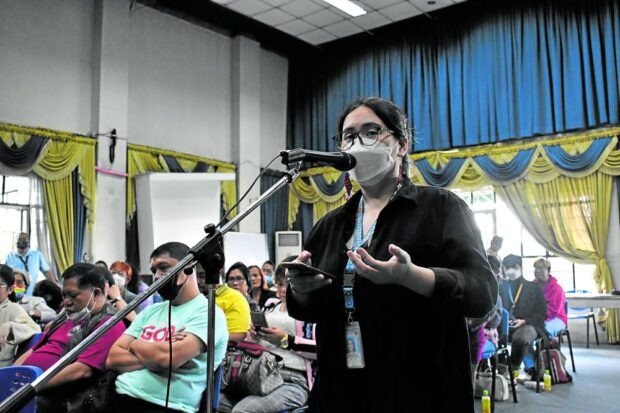Anti-communist lectures in Baguio schools alarm mental health expert

YOUNG LEADER Gabrielle Francisco, president of Saint Louis University Kasama Supreme Student Council, speaks during a public consultation at the Baguio City Council on April 19 where she raises the concerns of students who reportedly suffered from psychological distress after attending a government lecture against communist groups. —JETHRO BRYAN ANDRADA/CONTRIBUTOR
BAGUIO CITY—A government psychiatrist cautioned the military against showing graphic, violent images when conducting anticommunist lectures in schools, saying these could traumatize schoolchildren and adolescents.
“Exposure to graphic videos will make them (pupils) feel unsafe, and develop hopelessness and helplessness,” said Dr. Genna Hipolito, a psychiatrist at Baguio General Hospital and Medical Center, during a public consultation on Red-tagging on April 19.
Hipolito said violent images and introducing concepts like armed conflicts without an age-appropriate context to teens could result in depression, or self-harm in very extreme cases.
Councilor Jose Molintas, a human rights lawyer who led the discussions, said the consultation was organized to help the city council formulate policies against public and online harassment and the use of inappropriate anticommunist materials for schoolchildren.
The gathering also discussed a proposal to institutionalize a police bounty for suspected “communist terrorists,” which activists said would fuel more defamation campaigns against innocent residents.
Article continues after this advertisementThe forum partly addresses a Feb. 22 position paper submitted to the Commission on Higher Education by three youth organizations that called for a review of anticommunist materials, particularly violent images of slain rebels, that are being shown to university students, high school teens and allegedly even grade school pupils.
Article continues after this advertisementLouise Montenegro, a coordinator of the Kabataan party list and one of the youth leaders who drew up the position paper, said the violent images were part of orientation seminars or forums held in 10 colleges and high schools in Baguio City by the National Task Force to End Local Communist Armed Conflict (NTF-Elcac) in 2022.
“We do not know why we are being subjected to this. My face has been scattered all over social media and called a terrorist. I admit victims of Red-tagging have endured some degree of shame for fighting injustice which is not illegal,” Montenegro said at the consultation.
Writ of amparo
The Red-tagging lectures may also violate a 2021 writ of amparo issued by Judge Emmanuel Cacho Rasing of the Baguio Regional Trial Court Branch 1, which bars all police officers in the Cordillera from posting and sharing videos, photographs and commentaries that previously “vilified” four University of the Philippines Baguio students and graduates, said youth leader Nico Ponce, who sued the police alongside Montenegro.
Army Col. Christopher Sab-it, head of Task Group Baguio that has been touring colleges and public schools in the city to teach about the “communist threat,” had asked the city’s activists to help remove elements of Red-tagging from the lectures.
Task Group Baguio is a joint military and police initiative under the Army’s 5th Infantry Division that denounces the communist rebellion.
“We never said rallies were wrong,” noted Sab-it, who was also present in the consultation.
The lectures of Task Group Baguio, which was assembled in November last year, do not carry graphic images, said Army Lt. Tricia Pascual, who said their anticommunist campaign denounces the New People’s Army’s (NPA) alleged recruitment of teenagers.
One of the task group’s modules is an NTF-Elcac profile of former student activists who were slain in NPA clashes against government troops, and it emphasizes their association with activist organizations as well as the colleges they attended.
Among the group’s lecturers is self-proclaimed rebel returnee Ivylyn Corbin, who details how she was recruited to fight the government after serving a prominent activist group. INQ